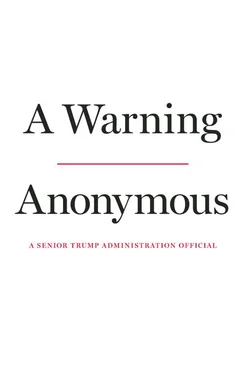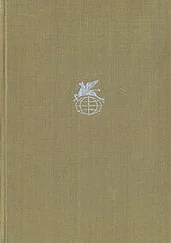Two traits are illustrative of what brought the Steady State together: the president’s inattentiveness and his impulsiveness. Both will be documented further in this book. But coming to terms with these characteristics for the first time had a powerful impact on the people serving in the administration.
Take, for instance, the process of briefing the president of the United States, which is an experience that no description can fully capture. In any administration, advisors would rightfully want to be prepared for such a moment. This is the most powerful person on earth we are talking about. But before a conversation with him, you want to make sure you’ve got your main points lined up and a crisp agenda ready to present. You are about to discuss weighty matters, sometimes life-and-death matters, with the leader of the free world. A moment of utmost sobriety and purpose. The process does not unfold that way in the Trump administration. Briefings with Donald Trump are of an entirely different nature. Early on, briefers were told not to send lengthy documents. Trump wouldn’t read them. Nor should they bring summaries to the Oval Office. If they must bring paper, then PowerPoint was preferred because he is a visual learner. Okay, that’s fine, many thought to themselves, leaders like to absorb information in different ways.
Then officials were told that PowerPoint decks needed to be slimmed down. The president couldn’t digest too many slides. He needed more images to keep his interest—and fewer words. Then they were told to cut back the overall message (on complicated issues such as military readiness or the federal budget) to just three main points. Eh, that was still too much. Soon, West Wing aides were exchanging “best practices” for success in the Oval Office. The most salient advice? Forget the three points. Come in with one main point and repeat it—over and over again, even if the president inevitably goes off on tangents—until he gets it. Just keep steering the subject back to it. ONE point. Just that one point. Because you cannot focus the commander in chief’s attention on more than one goddamned thing over the course of a meeting, okay?
Some officials refused to believe this is how it worked. “Are you serious?” they asked, quizzing others who’d already briefed the president. How could they dumb down their work to this level? They were facilitating presidential decisions on major issues, not debates about where to go out for dinner. I saw a number of appointees as they dismissed the advice of the wisened hands and went in to see President Trump, prepared for robust policy discussion on momentous national topics, and a peppery give-and-take. They invariably paid the price.
“What the fuck is this?” the president would shout, looking at a document one of them handed him. “These are just words. A bunch of words. It doesn’t mean anything.” Sometimes he would throw the papers back on the table. He definitely wouldn’t read them.
One of the hardest culture shifts took place with the National Security Council. NSC staff were accustomed to producing long-winded classified memos. But if the aim was to educate this new commander in chief, they couldn’t submit a fifty-page report entitled something like “Integrated National Strategy for Indo-Pacific Partnership and Defense,” expect him to read it, and then discuss it. That would be like speaking Aramaic to Trump through a pillow; even if he tried very hard to pay attention, which he didn’t, he wouldn’t be able to understand what the hell he was hearing.
It took a lot of trial and error for West Wing staff to realize there needed to be a change in the White House briefing process. Until that happened, officials would walk out of briefings frustrated. “He is the most distracted person I’ve ever met,” one of the president’s security lieutenants confessed. “He has no fucking clue what we are talking about!” More changes were ordered to cater to Trump’s peculiarities. Documents were dramatically downsized, and position papers became sound bites. As a result, complex proposals were reduced to a single page (or ideally a paragraph) and translated into Trump’s “winners and losers” tone.
Others discovered that if they walked into the Oval Office with a simple graphic that Trump liked, it would more than do the trick. We might hear about it for days, in fact. He would hold on to the picture, waving it around at us in meetings. “Did you see this? Can you believe this? This is beautiful. Something truly special. Dan!” He might summon the White House’s social media guru, who sits just outside the Oval Office. “Let’s tweet this out, okay? Here’s what I want to say…” That way the public would get to share in his excitement, too.
One graphic that left Trump spellbound was intended to explain certain government and industrial relationships. The basic depiction of interlocked gears, likely pulled from clip art, showed how different elements of the government bureaucracy depended on parts of the private sector. The president was so mesmerized that he showed it off to Oval Office visitors for no apparent reason, leaving us—and them—scratching our heads. Another time he became enamored with a parody poster in the style of Game of Thrones , with the words “Sanctions Are Coming,” overlaid on a photo of the president. This was meant to be a teaser for forthcoming Iran sanctions. Trump was elated and tweeted the image out to his followers at once, resulting in a cycle of memes mocking the graphic.
Seeing this type of behavior was both educating and jarring to the burgeoning Steady State. It was a visceral lesson that we weren’t just appointees of the president. We were glorified government babysitters.
The feeling of unease was cemented by having to deal with the president’s penchant for making major decisions with little forethought or discussion. These “five-alarm fire drills,” as I call them, seemed like a curse. When Trump wanted to do something, aides might only get a few hours’ notice from him before he announced it. They then launched a frenetic response effort, a race against the clock to reshape his views before the tweet went out. This could upend entire workdays. Over time, the last-minute warnings actually came to be seen as a luxury. It’s better to have a few hours—or minutes, for that matter—to intervene than have no opportunity at all to convince Trump to hit the brakes on a wacky or destructive idea. He’s less inclined to preview his decisions today.
Here is how it might play out in the early days of the administration: The president sees something on television. He doesn’t like it. It makes him think, “Maybe I should fire the secretary of commerce,” or “We should pull out of that treaty. It’s really a terrible treaty, after all.” He might tee up a tweet. Then he bounces it off of the next aide he talks to, who is stunned to discover that the terrible idea is tip-of-brain for the president of the United States, and might be on the brink of becoming reality. The aide finds the president disinterested in thinking through the consequences. “We’re going to do this today, okay? Tell Sean to get ready.” He wants Press Secretary Sean Spicer prepared to defend it to the death.
Staff throw up the Bat-Signal, calling a snap meeting or a teleconference. “He’s about to do something,” one warns the group, explaining what the president is about to announce.
“He can’t do this. We’ll all look like idiots, and he’ll get murdered for it in the press,” another exclaims.
“Yeah, well, I’m telling you he’s going to do it unless someone gets to him fast,” the first warns. “Can you cancel your afternoon?”
Officials rush back to the White House. The delicate Oval Office schedule is shattered to make way for an unexpected intervention, and top agency executives scrap meetings with foreign leaders, press conferences, and briefings to join the gathering. The conversation with the president is tense. He wants to do what he wants to do, consequences be damned. It isn’t beneath him to attack his own family members, too. “Jared, you don’t know what you’re talking about, okay? I mean seriously. You don’t know.” After some dire warnings (“Everyone will get subpoenaed”—“This will cost you dearly with working-class voters”—“This will put Americans in harm’s way”), he might show signs of reconsidering. Refusing to admit error, the president insists he still wants to go with his original plan, but he backs off temporarily or agrees to a less drastic measure, averting disaster for the moment.
Читать дальше





![Автор неизвестен Детская литература - Верхом на урагане [Из американского фольклора]](/books/25390/avtor-neizvesten-detskaya-literatura-verhom-na-urag-thumb.webp)


